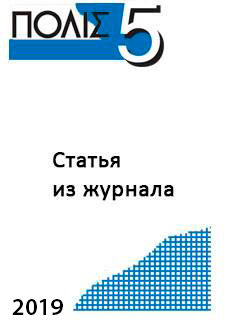Online shop of "Polis. Political Studies" Journal
We in the world, the world in us
Blagoveshchensky Yu.N., Satarov G.A. Network Modeling of Mass Political Consciousness. A Method.. – Polis. Political Studies. 2019. No 5. P. 96-118 (In Russ.)
Free!
sociology of associations, mass consciousness, public opinion polls, complex networks, networks of mass consciousness, topological characteristics of networks, power laws.
The article presents the experience of constructing three networks and a comparative analysis of these, where the nodes are the vectors of respondents’ answers to almost identical sociological questionnaires in three countries – Russia, Kazakhstan, and Estonia. The questionnaires that regarded citizen’s political attitudes and the practices of these three countries have been used in polls conducted between the spring and the fall of 1998. The set of respondents’ replies to one questionnaire was represented as a set of binary vectors. These binary vectors correspond to the nodes of the constructed network. At the initial stage, the standardized residuals, as measures of statistical dependence between nodes (response vectors), were used as measures of the connection between nodes. Thus, a weighted network of each survey was obtained. After that, according to the general formal rule of the threshold of determination, there has been a transition from a weighted to a binary network. The main subjects of comparative analysis were the topological (structural) properties of such binary networks which are used in network studies on networks from different origin. The networks constructed in this way were then used in the study as models of the respondents’ mass consciousness. The authors studied and interpreted the cluster structure of networks that include the structure of a particular degree distribution of network nodes. This helped the authors to obtain significant results concerning the degree of distribution in the networks nodes examinded. The hypothesis that these networks shape a separate class of complex networks is confirmed. The study provides sociological facts that could not be found out by traditional methods of statistical analysis of poll results, based on counting the frequency of responses in the whole sample and within the standard groups. These results suggest that the proposed approach allows us to interpret the networks that are constructed by the proposed method as models of mass consciousness, and that this network approach allows new verifiable facts about mass consciousness to be obtained. The authors provide ideas of possible directions of scientific research in this field.
 English
English Русский
Русский

Reviews
There are no reviews yet.